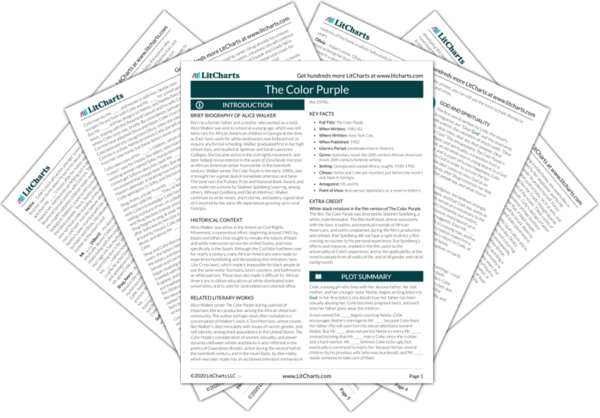The novel takes place in two distinct settings—rural Georgia and a remote African village—both suffused with problems of race and racism. Celie believes herself to be ugly in part because of her very dark skin. Sofia, after fighting back against the genteel racism of the mayor and his wife, ends up serving as maid to that family, and as surrogate mother to Eleanor, who does not initially recognize the sacrifices Sofia has been forced to make. In general, very few career paths are open to the African Americans in the novel: for the men, farming is the main occupation, although Harpo manages to open a bar. For women, it seems only possible to serve as a mother, or to perform for a living, to sing as Squeak and Shug Avery do.
In Africa, the situation Nettie, Samuel, Corrine, Adam, Tashi, and Olivia experience is not that much different. Nettie recalls that the ancestors of the Olinka, with whom she lives, sold her ancestors into slavery in America. The Olinka view African Americans with indifference. Meanwhile the English rubber workers, who build roads through the village and displace the Olinka from their ancient land, have very little concern for that people's history in Africa. The British feel that, because they are developing the land, they "own" it, and the African people who have lived there for centuries are merely "backward" natives. It is only at the very end of the novel, after Samuel, Nettie, and their family have returned from Africa, to Celie's home in Georgia, that Celie and Nettie's entire family is able to come together and dine—a small gift, and something that would be considered completely normal for the white families of that time period, whose lives had not been ripped apart by the legacy of slavery and poverty.
Race and Racism ThemeTracker

Race and Racism Quotes in The Color Purple
Sofia look half her size. But she still a big strong girl. Arms got muscle. Legs, too. . . . She got a little pot on her now and give you the feeling she all there. Solid. Like if she sit down on something, it be mash.
What that song? I ast. Sound low down dirty to me. Like what the preacher tell you its sin to hear. Not to mention sing.
She hum a little more. Something come to me, she say. Something I made up. Something you help scratch out my head.
I don't know, say Sofia. Maybe I won't go. Deep down I still love Harpo, but—he just makes me real tired. She yawn. Laugh. I need a vacation, she say.
I don't know, say the prizefighter. This sound mighty much like some ole uncle Tomming to me.
Shug snort, Well, she say, Uncle Tom wasn't call Uncle for nothing.
Sofia say to me today, I just can't understand it.
What that? I ast.
Why we ain't already kill them off.
…
Too many to kill off, I say. Us outnumbered from the start.
She singing all over the country these days. Everybody know her name. She know everybody, too. Know Sophie Tucker, know Duke Ellington, know folks I ain't never heard of. And money. She make so much money she don't know what to do with it.
But God, I miss you, Celie. I think about the time you laid yourself down for me. I love you with all my heart.
Did I mention my first sight of the African coast? Something struck in me, in my soul, Celie, like a large bell, and I just vibrated. Corrine and Samuel felt the same. And we kneeled down right on deck and gave thanks to God for letting us see the land for which our mothers and fathers cried—and lived and died—to see again.
Today one of the boys in my afternoon class burst out, as he entered, The road approaches! The road approaches! He had been hunting in the forest with his father and seen it. Every day now the villagers gather at the edge of the village near the cassava fields, and watch the building of the road.
Now the engineers have come to inspect the territory. Two white men came yesterday and spent a couple of hours strolling about the village, mainly looking at the wells. Such is the innate politeness of the Olinka that they rushed about preparing food for them . . . And the white men sat eating as if the food was beneath notice.
You may have guessed that I loved him all along; but I did not know it. oh, I loved him as a brother . . . but Celie, I love him bodily, as a man! I love his walk, his size, his shape, his smell, the kinkiness of his hair.
But guess what else . . . When the missionaries got to the part bout Adam and Eve being naked, the Olinka peoples nearly bust out laughing . . . They tried to explain . . . that it was they who put Adam and Eve out of the village because they was naked. Their word for naked is white. But since they are covered by color they are not naked.
And I see they [the children] think that me and Nettie and Shug and Albert and Samuel and Harpo and Sofia and Jack and Odessa real old . . . But I don't think us feel old at all. And us so happy. Matter of fact, I think this the youngest us ever felt.











